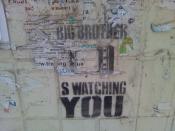1984, by George Orwell, is, on the surface, the story of one man's rebellion against the system in a futuristic totalitarian world. Every word and movement of the citizens is monitored and controlled; even their thoughts are not their own. They are manipulated by the insidious propaganda of the government, Big Brother, that serves to weaken the power of the people. This relates to what the dictator, Josef Stalin, once said: "Power is not in the hands of those who vote, but rather in the hands of those who count the votes." In other words, people may be led to believe they are in control when they, actually, are not. Winston Smith, the main character, realizes how dangerously ill society is becoming, and his beliefs lead him to rebel against the government. Orwell illustrates throughout the novel the value of individualism and the dangers of giving it up without a fight.
Faced with the threat of such a totalitarian state, the only effective way to prevent the degradation of society is to never lose touch with reality, retaining a strong sense of self by holding onto individual thoughts, beliefs, and liberties.
Newspeak is used by Big Brother to coerce the population into communicating less and less with each other until, eventually, Big Brother is the citizens' only source of contact with the world. As Syme puts it, "Don't you see that the whole aim of Newspeak is to narrow the range of thought . . .has it ever occurred to you that by 2050, not a single human being will be alive who could understand the conversation we are having now?" (47). The ultimate goal of Newspeak is the loss of thought by the citizens. Syme illustrates this by saying, "By 2050 ⦠In fact, there will be no...


